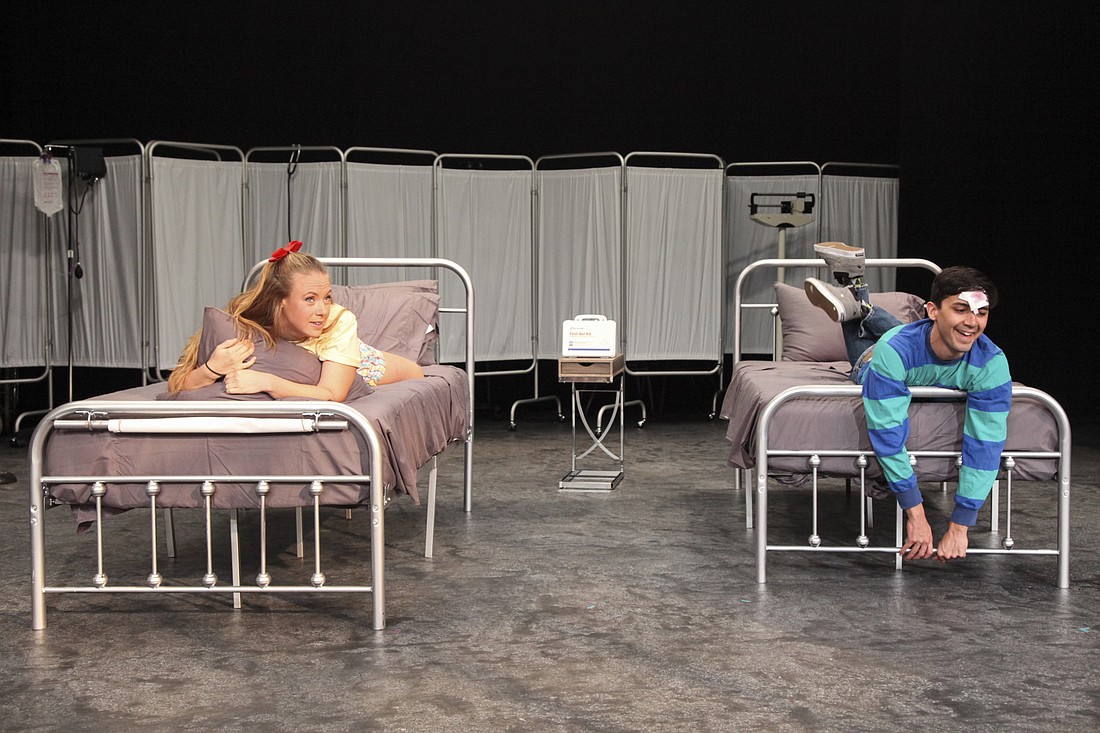- July 4, 2025
-
-
Loading

Loading

Rajiv Joseph’s “Gruesome Playground Injuries” is the latest FSU/Asolo Conservatory production. The title is truth in advertising, not a metaphor. Joseph’s cutting black comedy is strong theater, and not for the squeamish.
The play’s two characters are accidents waiting to happen. Doug (Alex Rodriguez) is a boastful daredevil. In the tradition of “Jackass,” he’s fond of bonehead stunts like riding a bicycle off his school’s roof like Evel Knievel. That stunt as an 8-year-old gashes open his face and lands him in the school infirmary. He meets up with Kayleen (Anna Newbury), who suffers from a perpetual stomachache. Kayleen shyly asks to touch his wound; Doug obliges her. Their weird friendship begins. You see them reconnect over the years. Each meeting marks a new injury. Either for him or for her, and sometimes both.
Doug’s idiotic derring-do has a predictable result. As your mama always said, “You could lose an eye.” Doug does — and he’s just getting started. Accident by accident, Doug gets slowly whittled down. (He reminds me of Allardyce T. Meriweather— Martin Balsam’s con-artist character in Arthur Penn’s “Little Big Man.”)
Where Doug’s self-inflicted injuries are in your face, Kayleen’s are out of sight. She’s a secret self-cutter — and in her 30s winds up in a mental hospital after a nasty bit of self-surgery.
Ashley Teague directs with crystal clarity. Nothing else will work. Joseph’s play combines bloody subject matter with a scrambled chronology worthy of Quentin Tarantino. The eight scenes jump around in time; the actors play their characters at different ages and change costumes in plain sight. Teague pulls it off beautifully, and so do Newbury and Rodriguez. One actor announces the time at the start of each scene. It’s superfluous information. Thanks to subtle cues in the actors’ body language and speaking styles, you’re always clear about where they are in their lives.
Rodriguez’ Doug is a puckish imp—and not the brightest bulb on the Christmas tree. He shrugs off his injuries and gets big laughs with lines like: “I like to get stitches. It makes your skin feel tight!” His character bubbles with zest in his younger incarnations. It’s heartbreaking watching life gradually slap the smile off his face. Newbury’s Kayleen is damaged from the get-go. She’s drawn to Doug as a kindred, self-destructive spirit — possibly.
The creative team stitches this emergency room love story together with the dexterity of a front-line M*A*S*H* unit. Eliza Ladd’s movement coaching brilliantly evokes the characters’ ages. Chris McVicker’s “Outer Limits” set design morphs from infirmary to hospital to funeral home.
Ladd and Teague’s in-sight choreography of costume (and bandage) changes implies a weird karmic dance. Bryan Lewis’ sound design (with surreal clips of the Spin Doctors and Johnny Cash) and McVicker’s lighting add to the sense of limbo. The stagecraft hits an insanely high level at every level.
Joseph’s bloody, black comedy is gripping at first. In the last few scenes, the play loses its grip and stops being funny. I couldn’t figure it out at first. The acting and directing remain stellar. Joseph’s dialog is still razor-sharp. So what’s the problem?
Character, I think.
It’s a character study that doesn’t study the characters. You know that Doug and Kayleen hurt themselves. You never know why. The characters never look inside. Never ask themselves: “Why am I doing this? Why can’t I stop?” Their motives remain a mystery; they don’t even seem to have a choice. What’s left?
In the end, more wounds, more suffering for two characters you care about. There’s no dramatic tension because you know Kayleen and Doug can’t change. It’s like watching a driver go into a skid with no way to pull out. The crash is inevitable—so why keep watching?
There’s a fine line between empathy and rubbernecking. Joseph’s play crosses the line. On the other hand, it’s meant to be disturbing — and that’s no accident. This is an entertaining, gutsy, inventive original work of theater. It’s worth a second look.
I’ll delay my final accident report for now.